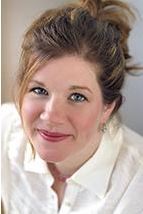Dar Williams is an American singer-songwriter and folk musician with 10 critically acclaimed studio albums. She has also taught at the Rocky Mountain Folks Festival song school, published two novels, and led the "Give Bees a Camp," which combines summer camp performances with the planting of bee-friendly gardens. In this interview, she shares her songwriting practices, fashion missteps, and lessons she's learned as a creative professional.
Omega: What is your idea of creative space? Where does that space exist for you?
Dar: I like to go to a place that stimulates my curiosity, usually a museum, and then go to wherever I can empty out all those thoughts. Usually all the space I can find is a café table, but sometimes I luck out with a long boardwalk.
Omega: When you recognize something that is so good you feel compelled to turn it into a song, how do you maintain the essence of it through the writing and refining process?
Dar: One direction is to believe in fractals--that's the law of nature that says on an oak tree, this branch will always be in this proportion to the trunk, and the limb will be in this proportion to the branch. I'll take an initial melody line and build it out proportionally, and likewise with "the voice" of the song. Is it a loose, summer-porch, slow song or a very tight, modern, fast song?
Sometimes the song surprises you. I had a slow, feminist musing about power dynamics with the line, "I will not be afraid of women," but then the line, "As cool as I am," came into my head. "As cool as I am, I will not be afraid of women." Suddenly, the narrator wasn't defensive, she was defiant, and I realized the bolder narrator was the right one. So I ditched the slow melody.
Omega: What is one thing you wish you knew or understood as a young artist?
Dar: I had the best managers, booking agents, and artists you can imagine. They were hardworking, kind, and honest. But nobody thought of fashion. I wore all my friends' hand-me-downs, including their bras. I wish I'd gone ahead and splurged on a new bra, among other things. I left my shoes in Joan Baez's hotel room once (she had the band in there after a show). In the morning my shoes were outside the door with this note: "Darling, You need new shoes. Otherwise you're perfect."
Omega: What have you seen in the children you've worked with? What are they bringing with them as they begin to leave their mark on society?
Dar: I think kids these days are ready to think holistically and compassionately. They have a media literacy that extends to understanding the way humans work. But that's what I see at summer camps, where kids are so open to things.
On the flip side, I've seen kids who don't let me or just about anyone into their bubbles, very monosyllabic and screen-craving and all that worrying stuff, and then, voila, they're sitting at the dinner table at 16 or 17 and they have intellectual curiosity, kindness, and social graces! All of those books, talks, and, yes, retreats, have added up somewhere and they're fine. Suddenly I see all the good they're going to bring to the world as adults. I hope my observation helps a few parents exhale.
Omega: What is one of the biggest lessons you have learned as a creative professional?
Dar: The wheel is always turning. You have a bad show and you'll have a good show. You have a block; you'll unblock. You feel worn out, and then you feel younger. And the loveliest thing: You meet a neurotic teen-aged fan, she disappears, you wonder what happened to your "fan base," and she appears 15 years later with two kids, and apparently they've been singing your songs since they were three, and now they're 10 and want to come to your concert with their mom. So that's the wheel turning, too.
Omega: You're someone who travels a lot for gigs and it inspired you to raise awareness about eating healthy on the road. You published The Tofu Tollbooth, a directory of natural food stores and restaurants. Has it become easier to find good food since then (1994)? Do you have any new food strategies for traveling?
Dar: I am personally a work in progress always. My friend Bernice Lewis has a rule of one salad a day, and I think that's a great aspiration. When that's your goal, a lot of other things line up. Usually food coops have salad bars, so I go there and end up buying other healthy things. I don't like using lots of utensils or packaging (I'm more concerned about that than I am about "food purity,") so I love burritos and things like that.
Omega: Politics and folk music have always seemed to work well together. Today, we all live in a global community, with global politics. The issues seem bigger than ever. How does this impact your songwriting?
Dar: A song is a song. It will come to you like a single golden thread that you can gently pull. It might be about war, or it might be about a child running in a field. Or a bar! I've written about all three. I let the song come to me or I'd be staring at a giant spool of thread saying, "Oh no, where do I begin?"
Explore more in the category of Creative Expression.
© 2015 Omega Institute for Holistic Studies, Inc. All rights reserved.

